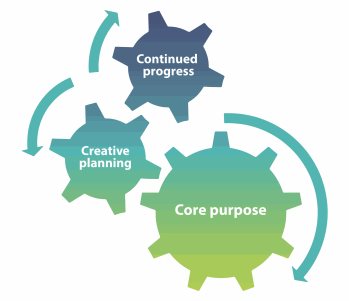Videos to accompany this material can be viewed on the PCI Vimeo channel here or you can watch them at the bottom of the page.
 Challenge and opportunity
Challenge and opportunity
As congregations begin to think about possibilities and practicalities for children’s and youth activities on Sunday and through the week in autumn and early winter, they do so against the background of ongoing disruption and uncertainties arising from the coronavirus pandemic and necessary restrictions caused by social distancing and enhanced standards of hygiene.
The present situation is subject to rapid change at very short notice with the need for congregations to constantly keep up to date with, and respond to, developing requirements and guidance issued by statutory bodies and PCI. As such, everything outlined below and in the other documents referenced, must be read with the possibility of further future advice superseding or altering the content.
Every area of life is experiencing upset – family, school, social, societal and church. Consequently, children and young people, and their parents and wider families, are stretched and stressed.
Difficult as the next season of programming will be, it provides an opportunity to show God’s love in very practical ways as we accompany children, young people and their families through what will be another period of upheaval in their everyday lives.
A phased return
A major priority in attempts to edge life back to greater normality is the enabling of a safe and successful return to schooling. If this can be managed successfully, it will be a significant step towards a return to regular routines in many areas of life, including church activity.
Consequently, for the church to make its contribution to this effort it is strongly recommended that the kind of regular, through the week programming of physical meetings for children’s and youth activities should not begin until October at the earliest and that planning should be for a gradual phased return thereafter as circumstances allow. In autumn and early winter, priority should therefore be given to digital ministry and other ways of keeping in touch with individuals and their families.
This approach will allow children and young people to settle into school during the first half of the new term, enable congregations to prioritise sustainable patterns of Sunday worship, take stock of overall activities and reduce pressure on leaders of organisations.
All of this need not mean that children’s and youth ministry should be put on hold, rather it presents the challenge and opportunity to seek a creative and imaginative, but safe and deliverable, response to the present situation. This will most likely involve a blend of ministry activity – predominantly through digital contact, supported by a limited number of physical gatherings maximising opportunities of being together while respecting necessary restrictions and exercising wisdom and restraint to curb the spread of infection.
Hopefully as the threat of coronavirus subsides we will have opportunity to build children’s and youth ministry activity back to more frequent and regular patterns of meeting together. Medium term planning should be undertaken with that in mind, but must always be flexible and involve careful attention to, and compliance with, up to date statutory and PCI requirements and guidance.
Understanding a new set of circumstances
Going forward into the next period, we should expect that activities for children and young people will not look as they usually do.
- Children and young people may not be coming to take part with a settled frame of mind because so much of their life has been upset by recent events that have taken their toll on mental health and well being
- Parents may be under additional pressure from responsibilities in home, work or family
- Leaders will carry similar responsibilities in everyday life and have to cope with integrating unfamiliar routines around ensuring social distancing and hygiene into the regular programme, finding that they intrude into the ease of running activities and normal interaction and relationship with children and young people
- There may be additional responsibilities before, during and after every week’s activities
- It is important not to be paralysed by the circumstances, but to commit to doing something manageable and effective to minister to children, young people and their families.
Adopting a blended approach
Many leadership teams will already have had the experience of having moved from regular face-to-face meetings to moving to the use of digital contact with children and young people during the early months of lockdown. As restrictions ease, but place added responsibility on physically gathering together in this next period, we should expect that a blended approach that balances digital activity with some meetings will be the norm.
Every organisation will be different in terms of its routines, activities, look and feel. Some will know their usual rhythms more interrupted by present circumstances than others. Some may not be able to recommence at all.
Due to the limitations on available space resulting from additional cleaning and set up requirements, leadership capacity and the need not to overload already extended children, young people and their families, some organisations may only be able to meet fortnightly, rather than every week. To enable church to function, activities may have to be planned on a monthly rota basis. Do not be discouraged if this happens, instead take permission to build a different programme gradually as unfolding circumstances allow.
These kind of realities will require a new approach to programme planning, both through engaging with children and young people through use of digital technology and when we meet.
Planning ahead
It will be more important than ever to plan the period from restarting in the autumn until the new year. Doing so will require greater flexibility and creativity than usual. As you meet to draw up your programme, it may be helpful to become comfortable with the following simple principles.
- Start small and build bigger – go for quality over quantity, don’t start what you won’t be able to sustain, less may turn out to be more in terms of ongoing impact and effectiveness
- Expect the overall situation to continue to evolve – get used to operating with greater uncertainty and be ready to set aside plans and do something different as circumstances change
- Don’t be overly focused on numbers regularly attending – these may fluctuate for all sorts of reasons beyond your control, but be sure to invest in keeping contact and deepening relationships with children, young people and their families
- Speak and pray often as a leadership team to support and encourage one another – beware of overextending leaders by trying to do too much and be prepared to learn as you go
 Programming with purpose
Programming with purpose
When programming, go back to your overall aim or core purpose. Stick fast to what you are trying to do, but be flexible in creatively planning finding new ways of doing it that fit present realities. Monitor continued progress by regularly asking how things are going. Don’t be afraid to try and fail, dust yourself down, learn from it and go again next time.
Do not be tempted to loosen up on social distancing, hygiene, safeguarding or other boundaries put in place to ensure everyone’s safety and wellbeing.
Distanced: A different way of meeting
Expect that when you bring children and young people back together it will involve ongoing social distancing and increased attention to hygiene and cleaning. Some of your normal activities may just not be possible. You will have to consider and develop a different way of meeting. Uniformed organisations will also provide some resources to help think through alternative programmes.
To help overall coordination and ensure someone in your church has oversight of all that is going on, the Presbyterian Church in Ireland has delegated authority to the kirk session of each congregation to carefully consider the resumption of all church activities. So, no organisation within a congregation can simply decide to resume meeting.
Your kirk session will decide when organisations and activities can restart and approve the dates for recommencing any activity. They have the task of working through the detailed guidance issued by the church and government, making a series of significant decisions and then ensuring all necessary preparations are in place.
It therefore makes sense to start a conversation with your kirk session earlier rather than later. You might want to drop your clerk of session and minister an email with some initial thoughts about dates and programming, what you think you might and might not be able to do as restrictions around meeting together continue. The advice issued from headquarters of uniformed organisations should be factored into discussion, but ultimately the decision about restarting activities and arrangements for doing so rests with kirk session. If other providers of children’s and youth activities not directly under the authority of kirk session are to use church premises, the same regulations and guidelines apply and care should be taken that they are informed and agree to operate accordingly.
Practical guidelines, simple advice and more detail for setting up to meet again can be found at the following links:
Have a look at the video links below to see how some churches are approaching gatherings with appropriate social distancing.
Digital: A different way of being in touch
Offering ministry digitally presents a different way of being in touchand keeping contact. Check out the videolinks below for some ideas of how churches are doing this and think about one or two that you might be able to learn from and adapt to your setting.
The use of technology and social media platforms has the potential to transform the way in which we can communicate and continue with some forms of ministry at this difficult time. However, keeping everyone safe whilst using these platforms is essential, and as it is a new experience for many, it is important to understand how to implement some simple steps that can contribute towards keeping people safe online. Safeguarding is as important in the virtual world as in the ‘real’ world, and therefore, the same rules should apply. Advice and best practice on how to do this safely can be found here:
Seeing God in the midst of it all
Finally, remember that God goes with you and ahead of you as you set out on this next phase of your children’s and youth ministry. He was with you and the children, young people and families under your care in the confinement of lockdown. He will be with you in the refinement of your programme over the next few months. He will have taught you a lot about the future alignment of what you do and how you do it when coronavirus is a thing of the past.
Taking Care in mentoring ministry
 Many congregations are finding great benefit in formal or informal mentoring schemes, or one-to-one contact in person or online, as youth ministry programmes remain closed or severely restricted due to Covid-19. The following interim guidance for this kind of ministry has been issued to ensure it develops in as safe a manner as possible for all involved.
Many congregations are finding great benefit in formal or informal mentoring schemes, or one-to-one contact in person or online, as youth ministry programmes remain closed or severely restricted due to Covid-19. The following interim guidance for this kind of ministry has been issued to ensure it develops in as safe a manner as possible for all involved.
The advice offers a list of must dos, suggestions for good practice, a sample parental consent form and a helpful checklist to guide those setting up a mentoring scheme, or to ensure safety of programmes that are already running.
Download it here
 Family Activities
Family Activities
This material from Engage Worship (downloadable above right) provides five days of core content for families to learn together about the practice of prayer.
Many of the activities could take place outdoors and with others as restrictions on meetings between households and social distancing allow.
Perhaps you could make the material your own with a video clip encouraging families to get involved and sharing links on your website and social media.
Why not involve the whole congregation with a Sunday follow up in which families produce short clips displaying their favourite activity and what they learned about prayer for upload to encourage everyone in prayer?
Monday – Walking with Jesus
Do you ever think about that Jesus joins you for your daily walk?
Tuesday – Praying Emotions with a Ball
Find a ball and go outside or somewhere without too many breakables!
Wednesday – Paper Aeroplane Prayers
Gather some paper, pens and/or crayons.
Thursday – Dice prayers
Find any dice you might have kicking around in your house.
Friday – Teddy Bear Prayer
This is ideal for those with little children (you could get any older kids to look up the Bible verses)
Videos
DISTANCED 1: Socially Distanced Games
Youth worker Paul Brown shares some creative ideas of how to engage young people in games from a distance.
DISTANCED 2: An approach to mentoring
Andrew Kelly shares how mentoring young people has developed in recent months within Gransha Presbyterian Church and offers helpful tools and advice on how to start doing this.
DISTANCED 3: Online children's minstry
Suzi Taylor, Children’s Worker in Waringstown Presbyterian shares her advice on engaging Children in online kids ministry.
DISTANCED 4: Sunday morning children's minstry
Ethan, a volunteer leader in Carnmoney Presbyterian shares how they have been doing Sunday morning children’s ministry together over the past month.
DIGITAL 1: Online Youth Alpha
Here are some practical tips and examples of how to run a Youth Alpha Course online and effectively engage young people in it.
DIGITAL 2: Zoom Kids Club
Andrew Kelly offers some practical advice of how to setup and run a kids club meeting on Zoom.
DIGITAL 3: Engaging Young People in Online Games
Youth Worker Phil Bailie, along with Matty from his youth, demonstrate some ways to engage young people in online games.
To go back to the Refined hub, click here.